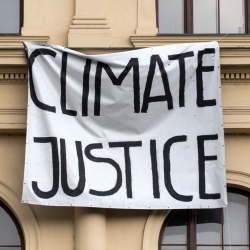Graduate Certificate in PK-12 Climate Justice Education
The Graduate Certificate in PK-12 Climate Justice Education is designed to encourage systemic change toward climate education across grade spans and curricular areas. The program uses a multidisciplinary approach that foregrounds issues of climate justice in students’ and teachers’ communities and helps ground climate education within a “pedagogy of hope.” Working in a collaborative cohort of PK-12 educators who span grade levels and subject area expertise, participants will design, enact, and lead transformative change in their school and community settings.
About the Program

The goal of the certificate program is to develop leadership capacity among practicing educators so that they are able to serve as leaders in climate justice education in their schools and districts as well as at the state and national level.
The 12-unit/one year Graduate Certificate in PK-12 Climate Justice Education serves the needs of current classroom teachers (grades PK-12) during a time when the need for climate education far exceeds what most teachers have been prepared to do in their classrooms.
While 86% of teachers and 80% of parents nationwide believe that climate science should be taught in PK-12 schools, fewer than half of teachers at this level report any climate-related content in their teaching (IPSOS/NPR, 2019).
The most frequently given reasons are lack of preparation/ knowledge base and the feeling that it falls outside educators’ subject area expertise. PK-12 teachers need access to content knowledge; culturally responsive, developmentally sensitive pedagogies; and supportive communities of practice in order to engage in teaching for climate justice.

Explore our Curriculum
| Course Number | Course Title | Prerequisite | Units | Semester |
| SCI 403 | Climate Change Science for Educators | Enrollment in Graduate Certificate in PreK-12 Climate Justice Education | 3 | Summer |
| EED 765 | Critical Issues in Science Education | Restricted to Graduate Curriculum and Instruction students or permission of the instructor *will be revised to “graduate standing” | 3 | Summer |
| RRS 499 | Race, Class, & Climate: Examining the Root Causes, Impacts, and Just Solutions to the Climate Crisis | Graduate Certificate in PK-12 Climate Justice Education students | 3 | Fall |
| EED 781 | Curriculum, Instruction, and Assessment for Teacher Leaders | Graduate standing; enrollment in Climate Justice Education Certificate; or permission of the instructor | 3 | Spring |
Participants will engage in professional writing that is in line with the kinds of writing needed in educational leadership positions. These include:
- Curricular analysis and policy white papers based on the analysis (EED 765)
- PK-12 curriculum writing (RRS 499 + EED 765)
- Training documents for teacher colleagues (EED 781 + RRS 499)
- Written and oral presentations of findings from participatory action research (EED 781)
- Writing/ communicating clear, accurate, and meaningful scientific explanations for a range of developmental levels on the PK-12 continuum (SCI 403)
At least one core writing project in each of the four classes will be assessed using a rubric and revised based on peer review and instructor feedback.
- Develop core scientific knowledge of the causes and impacts of climate change as relevant to PK-12 educational contexts.
- Critically examine the ecological, social, and economic impacts of climate change on communities educators serve.
- Develop culturally responsive, developmentally sensitive practices to engage PK-12 students in learning about the causes, impacts, and justice-based responses to climate change.
The Division of Graduate Studies processes the award of both graduate and undergraduate certificates. The Certificate Approved Program form and instructions can be found on the Division of Graduate Studies website. Students fill out the form once the coursework is completed and have the form signed by the advisor and department chair.
All courses for the certificate must be completed with a minimum GPA of 3.0 and only courses completed with a grade of C or better can be used to satisfy the requirements of a certificate.
Interested in Earning this Certificate? Follow These Steps:
Who Should Apply?
We welcome applications from teachers, informal educators and educational leaders with at least two years of experience in any area of PK-12 education.
Admission to the Graduate Certificate in Climate Justice Education program requires:
- A bachelor’s degree from an accredited institution
- A grade point average of at least 3.0 in the last 60 semester (90 quarter) units attempted
- At least two years of experience working with PK-12 students in informal or formal settings
Costs
$4740 ($395 per unit)
Length of Program
One year, starting in Summer 2024.
Scholarship Opportunities
Scholarships that cover full cost of attendance are available for a select group of students, with priority given to teams of three or more PK-12 teachers. Each team member should apply separately.
How to apply to scholarships?
All applications received by the priority deadline will be automatically considered for scholarships. There is no need to do anything else. If you apply by the priority deadline you will be considered for a scholarship.
Course Format and Schedule
Participants will meet in person for one week in the summer and for one weekend in the fall and spring semesters, with all other instruction occurring online.
This graduate certificate program uses a low residency instructional model to allow educators from a large geographical area to participate while also engaging in place-based learning.
Key Dates
Summer 2025 – Spring 2026
March 1, 2025: Priority application submission date (for scholarship consideration)
June 16, 2025 - August 8, 2025: Summer Session (EED 765 and SCI 403) Online + One Week in Person
June 26, 27, 28, and August 8, 2025: IN PERSON Week on SF State Campus, Monday - Friday, 9 a.m. - 4 p.m. (required)
August 25, 2025 - December 12, 2025: Online + In Person Weekend TBD
January 26, 2026 - May 15, 2026: Online + In Person Weekend TBD
Priority Deadline for Scholarships is MARCH 1st, 2025
Apply for this program using Cal State Apply. Please read this page in full before applying.
- March 1 - Priority application submission date to be considered for a scholarship.
- After March 1, qualified applicants will be admitted until all spots in the program are filled. We encourage you to apply by the March 1 priority deadline to be considered for funding.
Application Submission Materials
- A 300 – 500 word statement of purpose that addresses,
- How your experience as an educator informs your interest in climate change education.
- Your professional and personal goals for participation in the graduate certificate program.
- The strengths and resources you bring to the collaborative work of climate justice education.
- A current resume that demonstrates your experience in PK-12 education.
- One letter of recommendation from an educational supervisor (e.g., principal, department chair, program director) that speaks to your strengths as an educator and potential as an educational leader in climate justice education.
Information on CalState Apply Portal
To begin your application. Follow these steps.
- Go to CalState Apply and select "Summer 2025" then "Apply"
- Log in (or create an account)
- Go to "Add Program." Scroll down to "San Francisco Extension" and select "Summer Start Climate Justice Education."
- Complete the application with your application submission materials.
- Once you are ready to submit your application, you will copy and paste the fee waiver code where prompted, rather than pay the $70 application fee. Please request a fee waiver by clicking on the button below.
Need help with your Cal State Application?
Watch professor's Stephanie Sisk-Hilton's video walking you through the application process.
Our Partners
This program is offered in collaboration with the Graduate College of Education's Department of Elementary Education. The program is also receiving support from the campus-wide Climate Justice Leadership Initiative.
More Information

Contact Us
Stephanie Sisk-Hilton, Ph.D.
Professor, Department of Elementary Education
CEETL Faculty Director for Multimodal Excellence in Teaching and Learning
stephsh@sfsu.edu
(415) 338-1747
Eduardo Cerpa
Program Specialist
ecerpa@sfsu.edu
(415) 817-4244